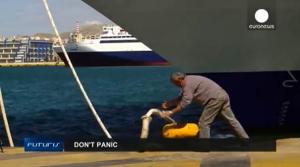Safer cruise ships thanks to EU-funded research
When choosing their summer holidays, many European opt for a cruise, or use a ferry to get where they are going. A very important aspect of passenger shipping is safety. Thanks to EU-funded research, evacuating large passenger ships could be even smoother and safer in future. EU-funded researchers are also helping to design more stable cruise ships and ferries.

The three-year LYNCEUS project, which ends in early 2015, is demonstrating how low-power wireless technologies can help localise and track people onboard ships, providing essential information in cases of evacuation, and improve overboard search and rescue. The aim is to revolutionise current emergency management and ship evacuation practice.
"We have developed innovative wireless tags, which can be embedded into life jackets, so the location of people within the ship can be easily pinpointed,” said Dr. Anastasis Kounoudes, technical leader and CEO of SignalGeneriX, one of the project partners. “This will provide safety officers with the exact location of every passenger and crew member during an evacuation.” The technology can also be used to monitor the health of patients requesting to wear special bracelets, or help parents keep track of the location of their children on large cruise ships, which can carry thousands of passengers and crew. The researchers in the project have also developed a radar device able to detect the exact location of passengers who have fallen overboard.
The GOALDS project, which ended in 2012, created new designs for large cruise vessels to increase their safety in the case of a collision or grounding. By redesigning the ships they would have up to 20% more chance of surviving groundings or collisions. These results have been submitted to the International Maritime Organization to improve safety standards and calculations for cruise vessels. The GOALDS project is part of a framework of EU-funded research to improve maritime safety.
European Research, Innovation and Science Commissioner Máire Geoghegan-Quinn said: "These projects are good examples of how we are tackling issues that can make people's lives better – in this particular case even potentially saving lives. We will continue to invest in this type of research and innovation in our new Horizon 2020 programme."
Source: European Commission
- 341 reads
Human Rights
Ringing FOWPAL’s Peace Bell for the World:Nobel Peace Prize Laureates’ Visions and Actions

Protecting the World’s Cultural Diversity for a Sustainable Future

The Peace Bell Resonates at the 27th Eurasian Economic Summit

Declaration of World Day of the Power of Hope Endorsed by People in 158 Nations

Puppet Show I International Friendship Day 2020

